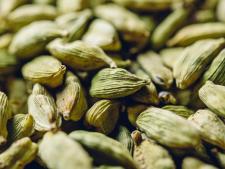-

Cardamom
| Food | Percentage of DRI per 100 grams | |
|---|---|---|
| manganese | 1227 | |
| iron | 172 | |
| zinc | 68 | |
| magnesium | 57 | |
| copper | 42 | |
| vitamin C | 35 | |
| phosphorus | 25 | |
| potassium | 24 | |
DESCRIPTION
Cardamom is referred to as the “Queen Spice” and is one of the most expensive spices, ranking third after saffron and vanilla. It is widely used around the world, especially in India, Ethiopia, Turkey, Middle East, Africa, Scandinavia and Southeast Asia. Cardamom can be found as whole pods, or powdered. Both the seeds and the pod have a pleasant, sweet, aromatic aroma with pungent and spicy notes. The use is vast, ranging from curries, soups, stews, pilafs, rice, puddings, marinades, baked goods, porridge, icecream, desserts, teas and other drinks.
VOLUME: Loud
HOW TO USE
Add early in the cooking process. For a more subtle flavor, add the whole pod. For a more sharp taste, use the seeds.
PAIR WITH
Almonds, apples, beans, cabbage, caramel, carrots, chili, chickory, chocolate, cilantro, cinnamon, cloves, coconut, coffee, coriander, cumin, dates, fenugreek, garam masaala, garlic, ginger, grains, honey, lemon, lentils, mangoes, maple syrup, nut m!lk, mint, orange, parsley, pears, pepper, pistachios, raisins, rose water, saffron, sweet potatoes, tofu, turmeric, vanilla, vegetables, yogurt.
HEALTH BENEFITS
Cardamom is rich in minerals including iron, magnesium, calcium, potassium, manganese and zinc. It is also anticeptic, antiviral, and a natural antibiotic. A study conducted at the Division of Entomology and Parasitology at the University of California has verified the presence of antimicrobial properties in cardamom.
In Ayurveda, cardamom has been used as a remedy for the digestive system to ease indigestion, nausea, crampings and food poisoning. And studies conducted at the Department of Chemistry in New Delhi, India have concluded that the extracted oils from cardamom show positive effects on gastrointestinal disorders, and can inhibit the growth and help kill off food borne bacteria in the digestive tract, thereby preventing food poisoning.
In Ayurveda and traditional Chinese medicine cardamom is also believed to be a remedy for teeth and gum problems – simply chewing on cardamom pods is said to support oral health and prevent gum and teeth infection. Chewing on cardamom pods can also acts as a natural breath freshener, releasing essential oil within the seeds. In fact, cardamom essential oil is often used as an ingredient in chewing gum.
Boiling cardamom and cinnamon in water is an Ayurvedic remedy used as a gargle to ease sore throat. Another way cardamom has been used in Ayurveda is as a remedy for urinary tract infections and disorders.
Cardamom has also been used as a remedy for support of the respiratory system. Studies at the Nitte University in Mangalore, India have shown the crude extracts from cardamom to be effective in relieving congestion and phlegm from the lungs and opening up constricted wind pipes. Another study shows cardamom improved blood circulation to the lungs, helping to cure asthma and bronchitis.